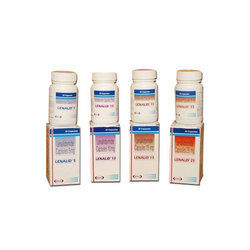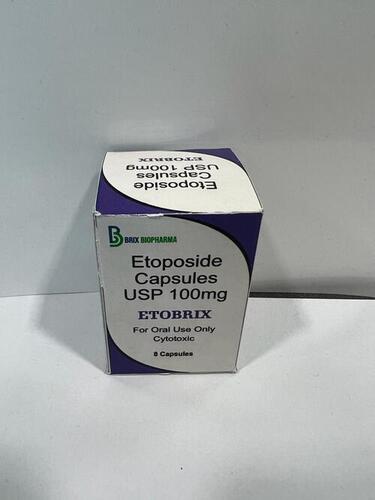

Lenalidomide Capsules
Product Details:
Lenalidomide Price and Quantity
- 18360 INR/Pack
- 1000 Pack
Lenalidomide Capsules Trade Information
- Cash in Advance (CID) Cash Advance (CA)
- 10000000 Pack Per Week
- 1 Week
- Western Europe Central America Africa Eastern Europe Middle East South America Australia Asia North America
- All India
Product Description
Lenalidomide, an immunomodulatory medicine used to treat multiple myeloma, a type of blood cancer, and specific myelodysplastic syndromes (MDS), is present in the drug Lenalid 10 mg. Lenalidomide suppresses the growth of cancer cells and modifies the immune system to work. The drug is administered orally, usually once daily. To increase therapeutic effectiveness, lenalid 10 mg is frequently administered in conjunction with other medications. In order to stop the progression of the disease, it is also used in the maintenance therapy for multiple myeloma. Fatigue, low blood cell counts, an increased risk of infections, and issues with blood clotting are just a few of the side effects that the drug may produce. The management of side effects and improvement of treatment outcomes depend heavily on routine monitoring by medical personnel.
Lenalidomide 10 mg's Characteristics and Advantages Include:
1. Lenalid 10 mg is an efficient drug for the treatment of multiple myeloma, a form of blood cancer that affects plasma cells.
2. Myelodysplastic Syndromes (MDS): It is also used to treat a few cases of this group of bone marrow issues known as myelodysplastic syndromes.
3. Lenalidomide is an immunomodulatory agent that improves the immune system's capacity to recognise and eliminate cancer cells.
4. Lenalid 10 mg is administered orally, making it comfortable and readily available for patients.
5. Combination Therapy: To enhance treatment outcomes and boost efficacy, it is frequently used in conjunction with other medications.
6. Lenalidomide is used in maintenance therapy for multiple myeloma to slow the spread of the disease and lengthen the period of remission.
7. Targeted Therapy: The drug only affects cancer cells, sparing healthy cells damage and minimising side effects.
8. Lenalid 10 mg has been found to increase overall survival and progression-free survival in patients with multiple myeloma.
9. It aids in promoting the generation of healthy blood cells, which can be suppressed in MDS and multiple myeloma.
10. Lenalidomide has been recognised by regulatory authorities as a safe and efficient therapeutic option for the treatment of multiple myeloma and particular myelodysplastic syndromes.
While Lenalid 10 mg has many advantages, it can also have negative effects like weariness, low blood cell counts, an increased risk of infections, and problems with blood coagulation. For patients receiving Lenalid 10 mg (Lenalidomide) therapy, regular monitoring and medical supervision are crucial during treatment to manage any potential side effects and guarantee the greatest results. This drug should only ever be taken as prescribed by a qualified healthcare expert.
Lenalid 10 mg (Lenalidomide) Uses Include:
1. Lenalid 10 mg is used to treat multiple myeloma, a form of blood cancer that affects plasma cells, in conjunction with other medications.
2. It is used to treat several myelodysplastic syndromes (MDS), a class of bone marrow conditions characterised by faulty blood cell generation.
3. Lenalidomide is used in some instances of the non-Hodgkin lymphoma known as mantle cell lymphoma.
4. Lenalid 10 mg (Lenalidomide) side effects include:Low Blood Cell Counts: Lenalidomide can result in a reduction in platelets (thrombocytopenia), white blood cells (neutropenia), and red blood cells (anaemia).
5. Increased Risk of Infection: Patients taking Lenalidomide may have an increased risk of infections due to its impact on blood cell counts.
6. Fatigue: During and after therapy, some patients may feel weak and worn out.
7. Lenalidomide can cause nausea and vomiting, both of which are typically treatable with antiemetic drugs.
8. Diarrhoea: Some Lenalidomide users frequently experience diarrhoea as a side effect.
9. Skin Rash: As a side effect of the drug, some people may get a skin rash.
10. Deep vein thrombosis (DVT) and pulmonary embolism are two blood clotting disorders that lenalidomide may make more likely.
11. Peripheral neuropathy: This condition can harm the nerves in the hands and feet, causing tingling, numbness, and discomfort.
12. Lenalidomide should not be used during pregnancy because it is known to cause birth abnormalities.
13. Rarely, taking Lenalidomide may trigger tumour lysis syndrome, a dangerous illness brought on by the quick death of cancer cells.
While using Lenalid 10 mg (Lenalidomide), patients should be regularly followed by their medical professionals, and any worrying symptoms or side effects should be reported right once to ensure proper management. A qualified oncologist or haematologist should always be present for the administration of this drug.

Price:
- 50
- 100
- 200
- 250
- 500
- 1000+
Other Products in 'Anti Cancer Tablets' category
 |
DHEER HEALTHCARE PRIVATE LIMITED
All Rights Reserved.(Terms of Use) Developed and Managed by Infocom Network Private Limited. |







